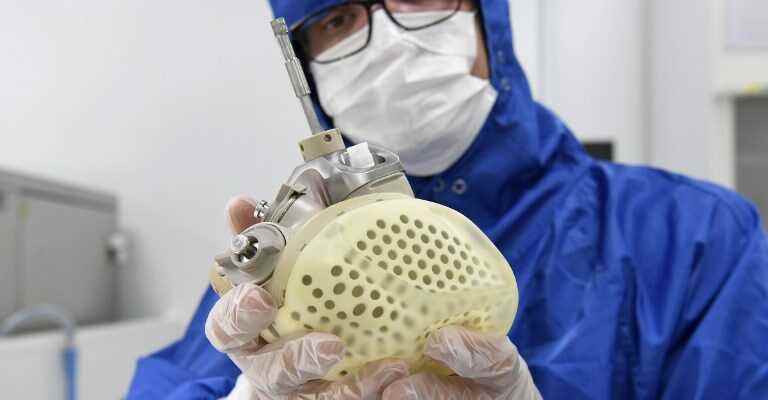(BFM Bourse) – Even taking into account the financial needs that will persist for several years for Carmat, Degroof Petercam estimates that in the absence of serious competition, the commercial prospects for the Aeson artificial heart justify a target price of 25.40 euros, leading analysts at the Belgian bank to adopt a buy advice.
With its Aeson cardiac prosthesis, now at the commercial stage, the French company Carmat has brought the development of an artificial heart to an unprecedented level, underlines Monday a new study by analysts. The idea of replacing the failing human organ with a fabricated device is far from new (theorized as early as the 19th century) but it has been a long journey. It was not until 1982 that the first “total artificial heart” -TAH for Total Artificial Heart, that is to say a prosthesis replacing the two ventricles unlike the left or right ventricular assistance devices- was been implanted. Despite the drawbacks inherent in its technology (noisy and brutal pneumatic heart for the circulatory system) it then gave rise to the first total artificial heart commercially approved by Syncardia from 1999 (the latter currently suspended in Europe again due to quality issues).
The hypothesis of the arrival of xenografts (grafts from animal species) does not seem able to change the situation for at least 10 to 15 years, according to the surgeon who succeeded in January 2022 in the first implantation of a genetically modified porcine heart, Dr. Bartley Griffith himself. Note that the operated patient unfortunately died two months later, for reasons not fully disclosed.
In a study by Christophe Dombu and Laura Roba, Degroof Petercam therefore highlights the unique competitive advantages that make Aeson the most advanced artificial heart in the world. First of all, it is an entirely bioprosthetic heart, the surface in contact with the blood being made of a haemocompatible material – which notably reduces the risk of haemolysis, i.e. damage and destruction. red blood cells. The prosthesis also reproduces the pulsatile rhythm of the human heart (the pump changes direction every 2 milliseconds allowing the activating fluid to move the membranes back and forth, mimicking the movement of the two ventricles), again to avoid anomalies. potentially serious pathologies. The fluid-based system has the further advantage of being silent. Finally, the Carmat product embeds sensors capable of determining the physiological needs according to the patient’s activity, to adjust the heart rate accordingly thanks to an algorithm.
Exploding needs
Analysts say Aeson could provide a solution for thousands of end-stage heart failure patients each year, knowing that today only 3% of patients awaiting transplant receive a donor graft, with the remaining number of grafts globally stable in recent years as needs explode. A market without real competition for years, given the still early level of other projects in progress: ReinHeart in Germany, Realheart in Sweden or Smartheart in the USA, believes Degroof Petercam. While sales have already started and should resume in October, the design office estimates the annual sales peak at 750 million euros once Aeson is prescribed as a definitive prosthesis (Destination Therapy) in addition to a solution awaiting a human transplant (Bridge To Transplant). And while the company’s development has so far been marred by clinical, regulatory and production delays, the analyst notes that these problems are common in the sector, including among much larger medical device players. “We believe that Carmat has the ability to overcome these obstacles, as he has demonstrated on several occasions”.
In financial terms, Degroof Petercam warns that clinical efforts will remain intense over the next three years, which will still require around 120 million euros of investment (before deduction of any subsidies), and that the company will still have to carry out refinancings, the next one by March 2023 presumably. However, the profitability horizon is expected for 2027.
On its main assumptions, Degroof Petercam calculates that the fair value of the security is 25.40 euros, leading the research office of the Belgian investment bank to adopt a purchase advice on the value. An opinion which finds a certain echo on Monday on the stock market, the title climbing by 9.03% to 12.44 euros around 4:15 p.m.
Guillaume Bayre – ©2022 BFM Bourse
Are you following this action?
Receive all the information about CARMAT in real time:
